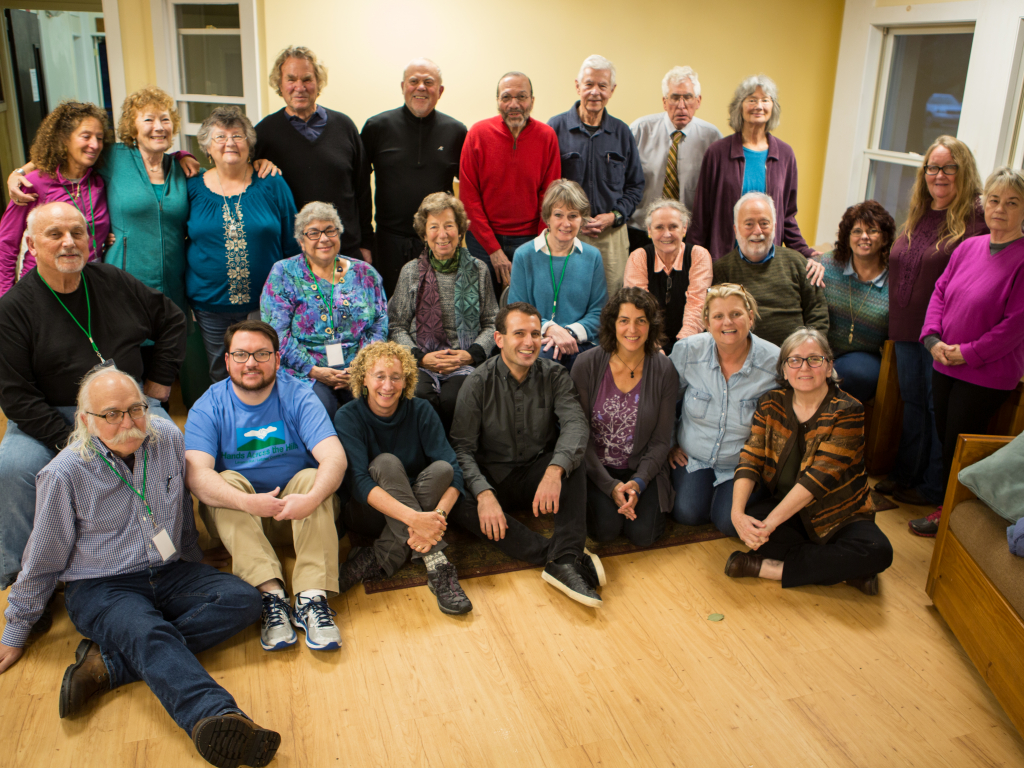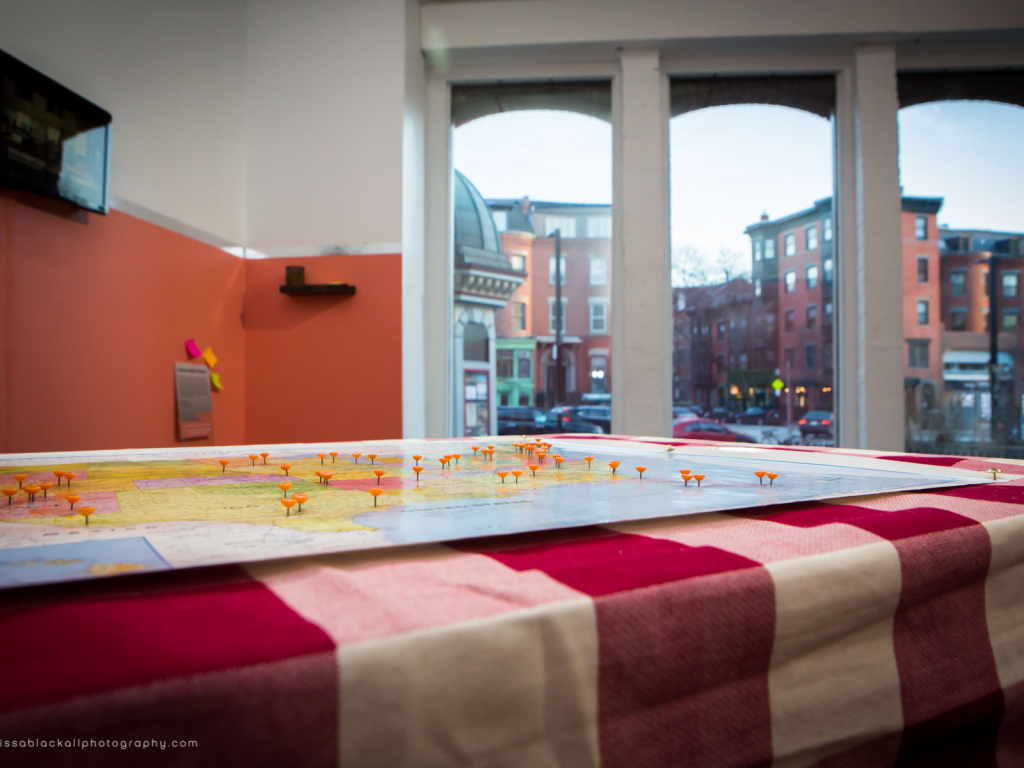Episode 83: Separated

A Guatemalan family living in Massachusetts faces a painful separation. Organic dairy farmers feel the squeeze of low prices and production quotas. And we talk to two communities on opposite sides of the political spectrum who are opting for dialogue over division. Plus, we hear the true story behind the legend of a notorious Rhode Island shipwreck; and learn how artists make a living in New England and beyond. WBUR’s Shannon Dooling fills in for John Dankosky this week.
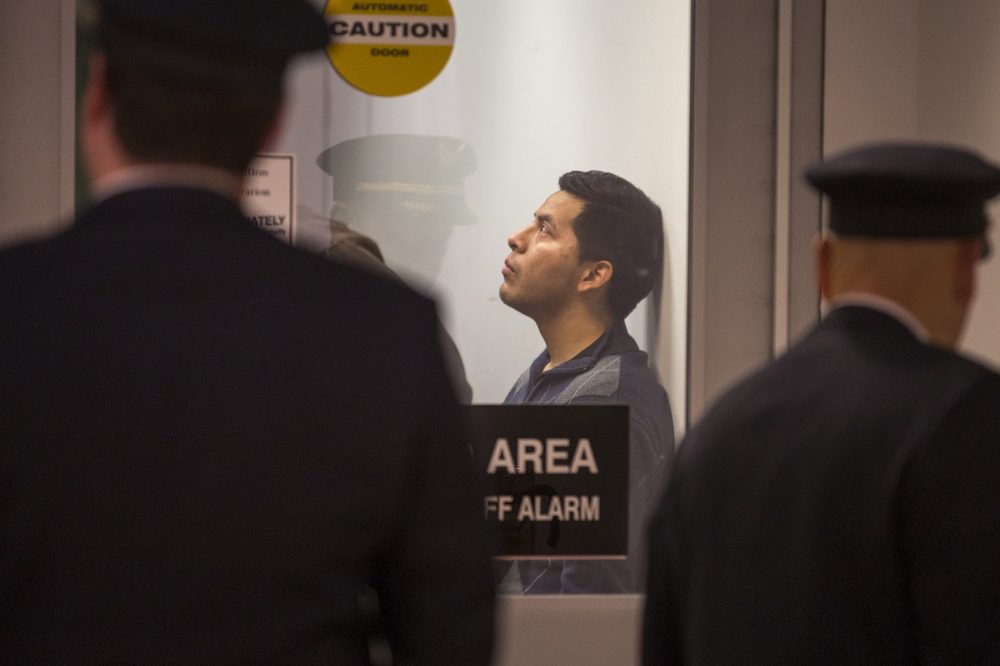
Isidro Macario waits at security as his travel documents are processed by ICE officers before boarding his flight. (Jesse Costa/WBUR)
“They’re Taking Them One-By-One”
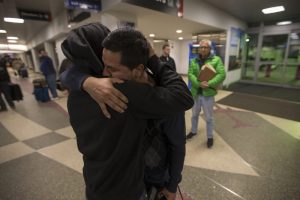
Isidro Macario, right, hugs his younger brother Erwin goodbye before being escorted by ICE officers to the boarding gate at Logan Airport. (Jesse Costa/WBUR)
Saying goodbye at Boston’s Logan Airport is a familiar, and painful scene for the four Macario brothers. Two years ago they said goodbye to their father when he was deported back to his native Guatemala after losing an asylum case.
This week, the oldest brother, Isidro, faced the same fate. Accompanied by federal immigration officers through airport security, Isidro was bound for deportation back to Guatemala, where he was born. Shannon Dooling met with the family in Lynn, Massachusetts just a few days before Isidro was deported.
Too Much Milk
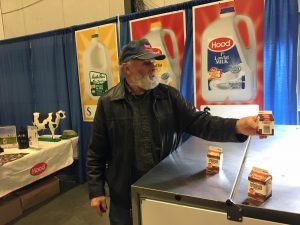
Randolph Center, Vt. farmer David Silloway offers free milk samples at the annual Farm Show. An oversupply of organic milk has stalled Silloway’s plans to earn a higher price for his product. (John Dillon/VPR)
Organic dairy farmers are getting paid less because of an oversupply of their milk.The overabundance was enough to keep one major organic buyer from signing up with new farmers.
For years, organic farming was a bright spot in the regional dairy economy. But as Vermont Public Radio’s John Dillon reports, organic milk sales are falling down, and so are the wages that farmers are paid.
Reaching Out
The election of President Donald Trump in 2016 left much of the country divided along strict partisan lines.
But residents in Leverett, Massachusetts, a small, liberal town just north of Amherst, wanted to know more about the people who voted for Mr. Trump. To do that, they had to look outside of their own community.
Paula Green, a professional conflict facilitator and co-founder of the Leverett Peace Commission led the charge. Her group reached out to conservative communities throughout the country, and they connected with one in Letcher County, Kentucky after reading an article written by a Connecticut native. Soon enough, the Leverett group was emailing back and forth with a community in the heart of coal country, many of whom were Trump voters.
Last October, community members from Letcher County visited Leverett for a three-day workshop, facilitated by Green. In April, the Massachusetts residents will visit Kentucky. They call the project “Hands Across the Hills.”
We got a group of women together on the phone– Paula Green and Danielle Barshak from Leverett, and Gwen Johnson and Nell Fields of Letcher County– to talk about finding common ground, gaining an understanding of divergent positions, and forging friendships.
Ghost Ship
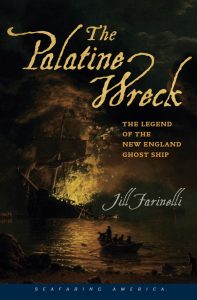 In 1738, a British merchant ship carrying immigrants from southwest Germany was grounded in a post-Christmas blizzard on the tip of Block Island. The storm and on-board sickness wiped out 200 passengers and crew members leaving, only 100 alive.
In 1738, a British merchant ship carrying immigrants from southwest Germany was grounded in a post-Christmas blizzard on the tip of Block Island. The storm and on-board sickness wiped out 200 passengers and crew members leaving, only 100 alive.
The incident grew to a local legend as tales of murder, mutiny, and theft began swirling. Over centuries, islanders have reported seeing an apparition of a flaming ship off the coast of Block Island.
Writer Jill Farinelli uncovers the true story of that shipwreck and its passengers in the new book The Palatine Wreck: The Legend of the New England Ghost Ship.
The Business of Culture
New England is often seen as a destination for history and natural beauty, but not necessarily as a hub for the arts.
But New Englanders are known for being hard-working, thrifty, and ingenious. And consultant-turned-podcaster Lucas Spivey says those qualities are just as important for artists as a creative spark. Spivey travels the country interviewing artists about how they make a living from their art. He does that inside the “Mobile Incubator” – a retrofitted 1957 Shasta Trailer. Then he publishes those interviews on his podcast, Culture Hustlers.
Mobile Incubator for Arts & Culture (LONG) from Mobile Incubator on Vimeo.
Spivey spent part of last summer and fall as the public-artist-in-residence at the Boston Center for the Arts, where he interviewed local creators of different stripes. Now he’s back at the BCA with a gallery show featuring works by artists from around the country.
NEXT producer Andrea Muraskin met up with Spivey for a tour of the exhibition and for an insight into the hustle of creating culture in New England.
Got a question about the business of the arts? Leave a voicemail for Lucas Spivey on the Culture Hustlers Hotline at 978- 712-8858. You just might get the answer in the form of a podcast.
About NEXT
NEXT is produced at WNPR.
Guest Host this Week: Shannon Dooling
Host: John Dankosky
Producer: Andrea Muraskin
Executive Producer: Catie Talarski
Contributors to this episode: John Dillon, Shannon Dooling and Andrea Muraskin
Special thanks this week to Ben Fink
Music: Todd Merrell, “New England” by Goodnight Blue Moon, “Not for Nothing” by Otis McDonald, “Down the Line” by Romare
Get all the NEXT episodes.
We appreciate your feedback! Send critique, suggestions, praise, questions, story ideas, and stories about your hustle to next@wnpr.org.

